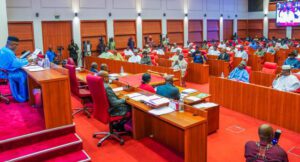FG to scrap sugar importation waiver
The Federal Government is set to remove import waiver incentive earlier approved to boost local sugar production. The proposed decision to cancel the waiver was reached after evaluation of the benefits considered as counterproductive in recent times following abuse by major companies.
This decision was reached after importing 13.6million tonnes of raw sugar under the failed Backward Intergration Programme. Findings revealed that no tangible improvement has been recorded as total local production remains at mere 600,000 tonnes or five per cent of the imports.
It was recorded that in 2013, the firms imported 1.45million tonnes; 2014, 1.47million tonnes; 2015, 1.46million tonnes; 2016, 1.47million tonnes; 2017, 1.82million tonnes; 2018, 1.87 million tonnes; 2019, 1.87million tonnes; 2020, 1.89 million tonnes; 2021, 1.88 million tonnes and 2022,1.93 million tonnes despite the incentives provided to encourage them.
The BIP policy seeks to among other things limit the importation of the commodity as well as create millions of jobs for Nigerians. Part of the incentives to boost domestic production of sugar include a five-year tax relief for investors in the value chain; 10 per cent import duty and 50 per cent levy on imported raw sugar; 20 per cent duty and 60 per cent levy for imported refined sugar. Also, between 2016 and 2020, NSDC, through the National Sugar Master Plan (NSMP), placed another 10 per cent duty and additional 80 per cent levy for raw sugar; 20 per cent duty and 85 per cent levy for refine sugar imports were provided.
Findings revealed that between 2019 and 2020, refined sugar attracted 10 per cent duty, 30 per cent levy raw sugar imports.
Worried by the abuse of BIP, the Executive Secretary of NSDC, Mr Zacch Adedeji, said that from now on, the sugar quota allocation of any sugar firm would be based on their performance under the BIP of the National Sugar Masterplan.
Adedeji said this during a separate tour of sugar refining sites in Lagos operated by BUA, Flour Mills and Dangote Sugar.
During the inspection tour, the Executive Secretary explained that government would take the implementation of the sugar masterplan seriously as the council commences the second phase in 2023.
He noted that the approval for raw sugar quota allocations to refineries would now be strictly based on their commitment to the BIP which they have signed onto.
Adedeji stressed that subsequent quota allocation would no longer depend on the size of refining capacity, rather, he said that it would be the extent to which operators had complied with the BIP policy.
He explained, “The next phase we are going, there is going to be a change, and the change in the next phase, which I want you to start having that model is that I will restrict the sugar allocation to your performance in the Backward Integration Programme.
“What this means is that if what you promised us from the BIP is only ten per cent of our self-sufficiency, you will only get ten per cent of the total allocation for sugar.
“Because the only reason why we are giving the projective tariff is that the difference between 70 per cent and the certain percentage you are being given is meant to be used on the farm.
“But if your total farm projection is not up to the quota you are collecting, that is a mismatch because if we are giving you 100 per cent and you are not producing 100 per cent, it means that at the end of the programme we will fail,” he said.
Adedeji added that some sugar firms had not reach their quota, saying that the government would be able to achieve more if these companies could partner with land owners to grow sugar cane.




